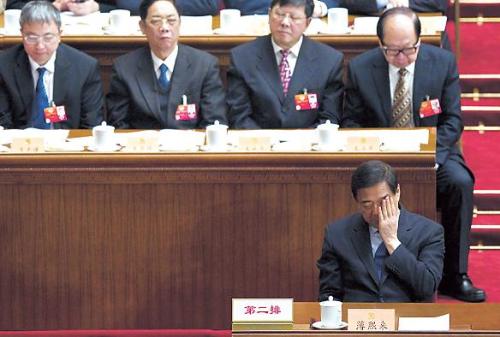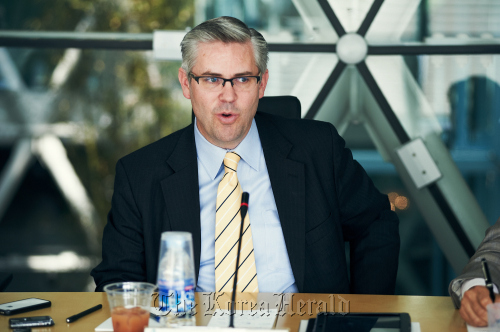Expert says leadership changes in S. Korea, U.S., Russia may not cause big policy change
The ouster of high-flying politician Bo Xilai from China’s Communist Party leadership in March is expected to readjust the direction of its North Korea policy, possibly toward restraining provocative behavior and encouraging openness, a renowned U.S. expert said.
Gordon Flake, executive director of the Maureen and Mike Mansfield Foundation, said that after the downfall of Bo representing the “old-school, reactionary” faction, reformists could gain more clout and consider recalibrating its approach to the North.
“He (Bo) was being attacked directly in person by (Chinese premier) Wen Jiabao and others who have been pushing for a much more open, reform-minded faction,” he said during a lecture earlier this month.
“Right now, at least, the reformist faction is ascended and that would lead to some hope that the Chinese might be willing, in the coming weeks or months, to further mitigate their approach to North Korea.”
The ouster of high-flying politician Bo Xilai from China’s Communist Party leadership in March is expected to readjust the direction of its North Korea policy, possibly toward restraining provocative behavior and encouraging openness, a renowned U.S. expert said.
Gordon Flake, executive director of the Maureen and Mike Mansfield Foundation, said that after the downfall of Bo representing the “old-school, reactionary” faction, reformists could gain more clout and consider recalibrating its approach to the North.
“He (Bo) was being attacked directly in person by (Chinese premier) Wen Jiabao and others who have been pushing for a much more open, reform-minded faction,” he said during a lecture earlier this month.
“Right now, at least, the reformist faction is ascended and that would lead to some hope that the Chinese might be willing, in the coming weeks or months, to further mitigate their approach to North Korea.”

Bo, a charismatic advocate of Maoist ideology, and reformist party leaders had been at loggerheads over key policy directions. Amid allegations of corruption and abuse of power, Bo, considered a candidate for the party’s nine-member Politburo, was sacked in March, revealing a deep factional fissure.
At the conference organized by the local think tank Asan Institute for Policy Studies, Flake focused on how this year’s political transitions in China, South Korea and the U.S. will influence their North Korea policies.
Touching on the possibility of China rethinking its handling of the North, Flake pointed to the considerable pressure it has recently applied on the country to deter further provocations, calling it a “remarkable step.”
Flake said the U.N. Security Council presidential statement issued after the North’s failed rocket launch in April was much stronger in its wording than the one adopted in 2009.

“This time, (the U.N. statement said) any future launches, whatever it may be, are against the rules. For China to say that to North Korea is a remarkable step. (As is) agreeing to further sanctions, and also putting forward a very clear warning against further provocative behavior,” he said.
China has long been criticized for supporting the North even after it launched military provocations such as the 2010 sinking of South Korea’s corvette Cheonan that killed 46 sailors.
China watchers have said that Beijing does not want to see any instability in North Korea as it prefers the status quo, and that the North is of great strategic value as a buffer against American power.
Offering his view of China’s North Korea policy, Flake said Beijing has “three nos” ― no nukes, no collapse and no war.
China has always tried to balance the three priorities, but it apparently started to give much more weight to “no collapse” after former North Korean leader Kim Jong-il suffered a stroke in the summer of 2008, he said.
But too much focus on “no collapse” apparently broke the balance of China’s priorities in its North Korea policy.
“By emphasizing too much no collapse, they actually increased the risk of war and they allowed North Korea to announce its uranium enrichment program with no consequences,” he said.
“So, you can argue that by focusing on one no, you are really messing up the other two nos.”
Flake said that the United States’ approach to the communist state is unlikely to be affected by it being an election year.
“The Obama administration’s approach was always structured as probing. It was testing North Korea’s intent,” he said.
“Now, the truth is, you may disagree with the actuality of what the North intended, but the interpretation in Washington is undeniably that North Korea failed that test with the decision to go ahead with the missile launch.”
Having said this, he stressed the North’s failure to show seriousness about its agreement it struck with the U.S. in February would only make Washington’s consistent policy stance more firm.
“There is no denying that (Republican presidential hopeful) Romney campaign will look for any excuse to portray the Obama administration as weak,” he said.
Sharing his thoughts on the leadership change in South Korea, Flake said he does not see any dramatic policy change coming.
“You cannot imagine away the (sinking of) Cheonan and the shelling (of the island of Yeonpyeongdo). These issues are all there. It does not matter whether it is Moon jae-in or Park Geun-hye (who wins the presidential election). They still have to be dealt with (it),” he said.
“More importantly, North Korea is different. Even if a South Korean administration came in and said we want to go back to the Sunshine Policy (of engaging the North), North Korea’s capacity to accept that is different now.”
The leadership transition in Russia may not affect its stance on North Korean issues as it is not a real change of government, Flake said.
“Dmitry Medvedev from Vladimir Putin and then Putin from Medvedev: It does not really represent a change in government. Obviously, Russia has a very important role to play in North Korea. Russia’s North Korea policy is constant,” he said.
Citing its long history of cooperation with the U.S. on nuclear arms control, Russia, compared with China, is a relatively responsible player when it comes to the issues of North Korea’s missile and nuclear tests, he said.
“China is viewing these issues still primarily through a regional context, through their alliance with North Korea and their proximity to the North. Russia views non-proliferation issues through a global context, institutional context,” he said.
Flake said that due to its political instability, Japan is not able to play a proactive role in engaging Pyongyang.
By Song Sang-ho (sshluck@heraldcorp.com)
-
Articles by Korea Herald







![[Graphic News] More Koreans say they plan long-distance trips this year](http://res.heraldm.com/phpwas/restmb_idxmake.php?idx=644&simg=/content/image/2024/04/17/20240417050828_0.gif&u=)
![[KH Explains] Hyundai's full hybrid edge to pay off amid slow transition to pure EVs](http://res.heraldm.com/phpwas/restmb_idxmake.php?idx=644&simg=/content/image/2024/04/18/20240418050645_0.jpg&u=20240419100350)








![[KH Explains] Hyundai's full hybrid edge to pay off amid slow transition to pure EVs](http://res.heraldm.com/phpwas/restmb_idxmake.php?idx=652&simg=/content/image/2024/04/18/20240418050645_0.jpg&u=20240419100350)

![[Today’s K-pop] Illit drops debut single remix](http://res.heraldm.com/phpwas/restmb_idxmake.php?idx=642&simg=/content/image/2024/04/19/20240419050612_0.jpg&u=)